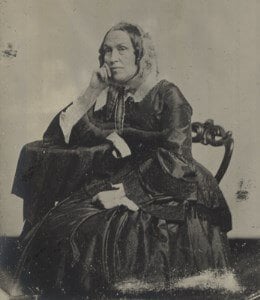Hannah Ropes

Civil War Women
A fervent abolitionist, writer, and head matron of the Union Hotel Hospital, Hannah Ropes was a pioneering social activist of the Civil War.
Ropes was a woman of a strong faith, and she opposed slavery from a young age. Because both her father and brother were prominent Maine attorneys (a path she may have followed if she had been a man, and thus free to pursue it), Ropes formed powerful political connections, like the abolitionist Senator Charles Sumner.
Ropes became involved in the abolitionist movement herself after her husband abandoned her and her children and she moved from Massachusetts to Kansas City. This proved to be a dangerous environment for the family as they were constantly under threat from violent pro-slavery raiders.
Thus, the family returned to Massachusetts after only six months. Nevertheless, her stint in Kansas City provided the inspiration for two books: Six Months in Kansas: By a Lady (a collection of her own letters) and Cranston House (a novel).
When the war broke out in 1861, Ropes used her connections to gather aid for wounded soldiers, but still wasn’t satisfied that she was doing enough to help the war effort. Then, in 1862, she volunteered with the Office of U. S. Army Nurses and subsequently became the head matron of Union Hotel Hospital in Georgetown. Merely a dilapidated tavern converted to treat wounded soldiers, Andrews knew she had her work cut out for her.
Ropes focused on making sure that her nurses treated their patients with compassion and kindness, and was known for immediately firing any nurse under her command who did not meet her standards. She even had a surgeon arrested after being caught stealing supplies.
Unafraid of her male superiors, she spoke out against cruelty and mistreatment of hospital patients. In one incident, Ropes reported a steward who was keeping an African-American boy in a cellar to Secretary of War Edwin Stanton himself.
Despite her professional strength, conviction, and courage, she was not immune to the dangers of her chosen field. In early 1863, both Ropes and another nurse working alongside her — Louisa May Alcott, author of Little Women — contracted typhoid pneumonia.
The pair continued to work despite their illness, but Alcott’s condition worsened, and Ropes sprung into action: She telegraphed Alcott’s family, imploring them to come to her bedside. On January 20, Alcott had recovered enough to return home, where she recuperated and began writing.
Ropes was not as lucky. The day that Alcott began her journey home, Ropes died of the same disease at the age of 53.





